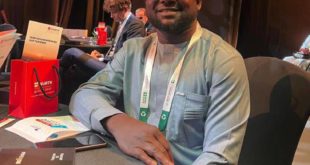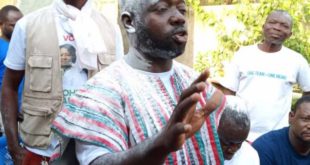Dr. Mahamudu Bawumia, vice president, has officially broke the ground for the development of Ghana’s first inland marine port and an associated industrial park at Debre in the Savannah Region.
LMI Holdings is developing the Trans-Volta Logistics Corridor, a multimodal transportation route that will use the Volta Lake to convey containers and bulk freight from the Port of Tema to Burkina Faso and other landlocked nations.
The Tema-Mpakadan railway line will be terminated at a new port that will be built to make it easier to load and unload cargo from Tema and Debre.
The Debre Inland Port is anticipated to positively impact transportation, the creation of jobs, rural development, revenue generation, and many other aspects of Ghana’s infrastructure.
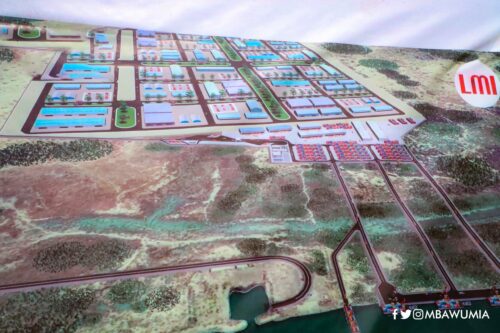
By 2025, the entire project is anticipated to be fully functioning.
Vice President Bawumia emphasized the significance of the project, particularly for the movement of products, cross-border trade, and maintenance of Ghana’s highways, in his remarks at the sod-cutting event on Friday, July 22, 2022.
One of the main goals of this port and industrial park will be to reduce the congestion caused by the clearance of goods from Tema.
Vessels will transfer cargo and containers to and from the Tema Port via the Volta Lake.These containers will be transported by train to the eastern region of Akwamu-Korankye, where they will then be placed onto barges and transported to the Debre Inland Port.
Containers will be unloaded and loaded onto trucks in Debre, which is working at its maximum capacity, just like Tema, with all the accompanying facilities, to continue their journey farther into the sub area.
Customs clearances and other services relevant to any international port will be offered.
Save the Roads in Ghana
“This $200 million inland marine port and the $250million Industrial Park will address a myriad of issues that continue to plague the movement of goods in Ghana and to our neighbours in the sub-region. Most of the over 30,000 trucks, annually, moving goods to landlocked countries of the northern boundary of Ghana will be taken off the roads. The total monetised benefit for the intervention encompasses a reduction in generalised cost, comprising vehicle operating cost, travel time, carbon emission, reduction in transportation cost and reduction in post-harvest losses,” he indicated.
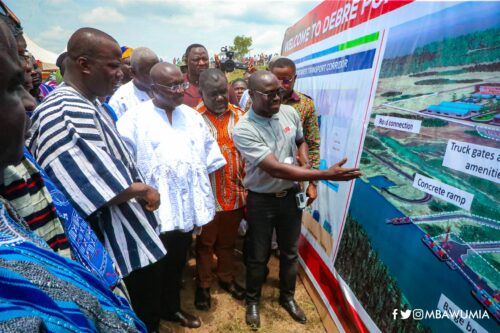
In Ghana, vehicles account for the majority of inland transportation; 97 percent of passenger traffic and 96 percent of freight are transported via the road system.
Our roads have suffered as a result of the strong reliance on roads for the transportation of commodities from the Tema port to Ghana’s landlocked neighbors, resulting in shorter road lifespans and safety concerns.
“The investment in Inland ports offer superior logistics, the opportunity of large warehouses, proximity to rail and highways, ample truck parking, less traffic congestion, and economic incentives. It is estimated that each barge trip from the inland port, will take over 300 trucks off our roads. This monumental intervention will reap major savings on road maintenance. It will reduce the incidences of fatal road accidents that we, unfortunately, too often read and hear about in the media.”
Dr. Bawumia noted that industrial parks, like the one in Debre, signify business preparedness in any situation by meeting the production and manufacturing requirements of enterprises and industries that can profit from one another.
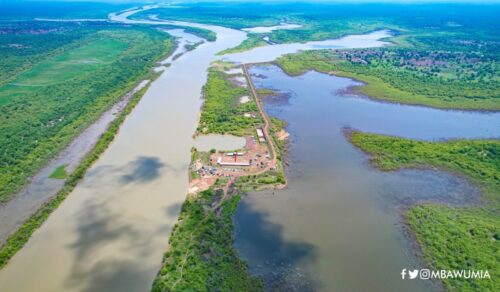
A competitive advantage that draws in international and foreign investors is the provision of subsidized services and infrastructure, such as roads, electricity, energy, water supply, and telecommunication services.
Industrial parks are necessary for our industrialization in a rising economy like ours.
This is demonstrated by the Tema Free Zones Enclave and the Dawa Park by LMI.
“As witnessed with the Tema Port and the attendant booming of factories and other economic activities, the opportunity for Debre’s holistic economic growth is about to take off. Debre’s geographic positioning makes it significant for the Inland Port and the Industrial Park to be sited. The deep depth of the Volta Lake year-round offers all-seasons availability for barges for transportation to and from Debre. With the creation of auxiliary roads, linking Debre to other towns, it will become a hub that will attract other stakeholders in the ecosystem to set up other complementary facilities and businesses.”
Dr. Bawumia reaffirmed the government’s commitment to fostering a climate that is supportive of private sector investment and urged other organizations to follow LMI Holdings’ lead.
Let me commend LMI Holdings for achieving this remarkable goal.
LMI as a business brings a wealth of expertise in infrastructure development to this project.
This Ghanaian company, which has assets worth over $450 million, has a stake in real estate, industrial utilities, construction, and logistics.
Over $3.4 billion in foreign direct investment has gone into Ghana’s economy over the past 20 years since LMI Holdings created the Special Economic Zones.
The director general of the Ghana Ports and Harbours Authority, Mr. Michael Luguge, the minister for transport, Hon. Kwaku Ofori Asiamah, the ministers for lands and natural resources, Hon. Samuel Abu Jinapor, and the governments of Burkina Faso, Mali, and Niger were all in attendance at the ceremony.
Source: Ghanatodayonline.com
 Ghanatodayonline.com News, Politics, Health, Education & More
Ghanatodayonline.com News, Politics, Health, Education & More
